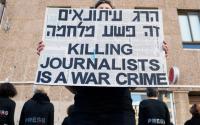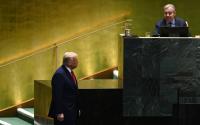20 July 2006Ed O'LoughlinThe Sydney Morning Herald
PARKED outside the small general hospital in Tyre is a badly refrigerated lorry container in which are stacked the bodies of 91 Lebanese civilians, 55 of them children.
The bodies have been placed inside black plastic rubbish bags and labelled in anticipation of the time, days or weeks from now, when their surviving relatives - if any - can come to collect them.
"It's a disaster. It's making me cry," the hospital's director, Dr Salman Zeineddine said. "We can't move them anywhere else. Since the attacks came I've been trying to get wounded out of Beit Jbeil and I can't. How could I get critical patients to Beirut, much less move dead people?"
Since Israel began bombing and shelling south Lebanon last Wednesday, about 380 patients have passed through this 65-bed hospital, plus the 91 dead.
Not one of the victims, he says, has been a member of Hezbollah, the militia group that triggered Israel's onslaught with a border raid last week.
"The army and Hezbollah - I don't care if they kill all of them," he said. "But the civilians - it's very hard. Everyone who has come in here has been a civilian."
Even as he spoke, another volley of ordnance - perhaps shells fired from a ship, perhaps missiles from a helicopter -
was crashing to earth a block away. Tyre, with the whole of south Lebanon, has become a killing zone.
While the Israeli Defence Force claims that it does its best to avoid harming civilians, it insists on its right to attack the terrorists who, it says, are using the population as "human shields". Its list of self-declared legitimate targets expanded yesterday to include all trucks south of the Litani River and all "structures used by terrorists".
Yesterday morning aircraft even attacked two trucks in the heart of Christian east Beirut that were reportedly carrying well-digging equipment.
Judging by the list of actual targets hit so far, what Israeli security experts term "the target bank" includes, in practice, civilian homes, minibuses and cars, as terrified families try to run away.
No one in south Lebanon feels safe. Streets and roads are almost deserted, and the few cars still daring to flee north out of Tyre career towards Beirut at breakneck speed, filled with frightened women and children waving white rags at the sky.
Bombing intensified yesterday morning - massive aerial bombs working up and down among the houses on a ridge line to the south, while closer to town sporadic bombs and rockets sent up clouds of debris and plumes of smoke.
There was no answering fire: Tyre is too far north to be a suitable launch site for Hezbollah missiles targeting Israel, and the city has no defence against air attack.
The bombs always strike without warning. The constant sound of jets and unmanned drones overhead, out of sight in the hazy sky, makes it impossible to know an attack has been launched until the earth suddenly convulses and - a moment or two later - the concussion strikes.
Yesterday the Israelis dropped leaflets across the region to "ensure the safety of Lebanese civilian population". A statement said: "The leaflets are intended to warn the Lebanese public to stay clear of areas from which rockets are launched against Israel, as these will be targeted by the [Israeli Defence Force] and civilians present in those areas are endangering their lives."






